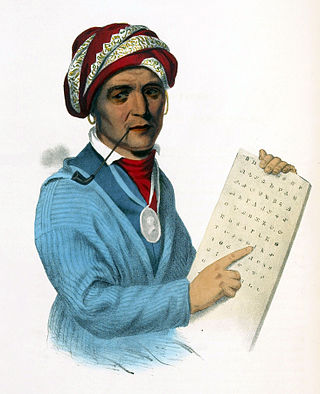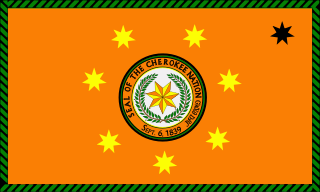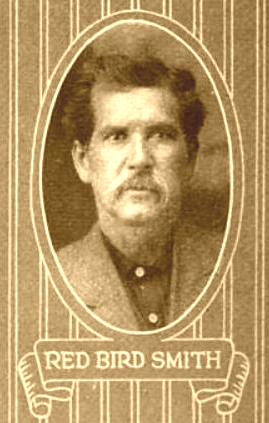
Sequoyah, also known as George Gist or George Guess, was a Native American polymath and neographer of the Cherokee Nation.

Chadwick "Corntassel" Smith is a Cherokee Nation politician and attorney who served as Principal Chief of the Cherokee Nation. He was first elected in 1999. Smith was re-elected to a second term as Chief in 2003 and a third term in June 2007 with 59% of the vote. He was defeated in his attempt to get elected to a fourth term in office by Bill John Baker 54% to 46% in the 2011 election and he lost again to Baker in 2015, receiving 28% of the vote. Prior to being elected Principal Chief, he worked as a lawyer for the tribe and in private practice.

The State of Sequoyah was a proposed state to be established from the Indian Territory in eastern present-day Oklahoma. In 1905, with the end of tribal governments looming, Native Americans in Indian Territory proposed to create a state as a means to retain control of their lands. Their intention was to have a state under Native American constitution and governance. Their efforts failed to gain support in Congress, and the territory was annexed to the United States in 1907.
Jesse Bartley Milam (1884–1949) was best known as the first Principal Chief of the Cherokee Nation appointed by a U.S. president since tribal government had been dissolved before Oklahoma Statehood in 1907. He was appointed by President Franklin D. Roosevelt in 1941, who reappointed him in 1942 and 1943; he was reappointed by President Harry S. Truman in 1948. He died while in office in 1949.

The Cherokee Nation, formerly known as the Cherokee Nation of Oklahoma, is the largest of three federally recognized tribes of Cherokees in the United States. It includes people descended from members of the Old Cherokee Nation who relocated, due to increasing pressure, from the Southeast to Indian Territory and Cherokees who were forced to relocate on the Trail of Tears. The tribe also includes descendants of Cherokee Freedmen and Natchez Nation. As of 2024, over 466,000 people were enrolled in the Cherokee Nation.
Sequoyah High School is a Native American boarding school serving students in grades 7 through 12, who are members of a federally recognized Native American tribe. The school is located in Park Hill, Oklahoma, with a Tahlequah post office address, and is a Bureau of Indian Education (BIE) grant school operated by the Cherokee Nation.
Talmadge Davis (1962–2005) was a Cherokee artist, who explored historical and military themes in his highly naturalistic paintings.
The Yowani were a historical group of Choctaw people who lived in Texas. Yowani was also the name of a preremoval Choctaw village.

Tommy Wildcat is a Native American musician and academic.
The Cherokee Male Seminary was a tribal college established in 1846 by the Cherokee Nation in Indian Territory. Opening in 1851, it was one of the first institutions of higher learning in the United States to be founded west of the Mississippi River.

The Sequoyah Constitutional Convention was an American Indian-led attempt to secure statehood for Indian Territory as an Indian-controlled jurisdiction, separate from the Oklahoma Territory. The proposed state was to be called the State of Sequoyah.

Cherokee history is the written and oral lore, traditions, and historical record maintained by the living Cherokee people and their ancestors. In the 21st century, leaders of the Cherokee people define themselves as those persons enrolled in one of the three federally recognized Cherokee tribes: The Eastern Band of Cherokee Indians, The Cherokee Nation, and The United Keetoowah Band of Cherokee Indians.

Redbird Smith (1850–1918) was a traditionalist and political activist in the Cherokee Nation in Indian Territory. He helped found the Nighthawk Keetoowah Society, whose members revitalized traditional spirituality among the Cherokee from the mid-19th century to the early 20th century.

The Cherokee Nation was a legal, autonomous, tribal government in North America recognized from 1794 to 1907. It was often referred to simply as "The Nation" by its inhabitants. The government was effectively disbanded in 1907, after its land rights had been extinguished, prior to the admission of Oklahoma as a state. During the late 20th century, the Cherokee people reorganized, instituting a government with sovereign jurisdiction known as the Cherokee Nation. On July 9, 2020, the United States Supreme Court ruled that the Muscogee (Creek) Nation had never been disestablished in the years before allotment and Oklahoma Statehood.
The following outline is provided as an overview of and topical guide to United States federal Indian law and policy:

Durbin Feeling was a Cherokee Nation linguist who wrote the primary Cherokee–English dictionary in 1975. He is considered the greatest modern contributor to the preservation of the endangered Cherokee language.

Sam Houston had a diverse relationship with Native Americans, particularly the Cherokee from Tennessee. He was an adopted son, and he was a negotiator, strategist, and creator of fair public policy for Native Americans as a legislator, governor and president of the Republic of Texas. He left his widowed mother's home around 1808 and was taken in by John Jolly, a leader of the Cherokee. Houston lived in Jolly's village for three years. He adopted Cherokee customs and traditions, which stressed the importance of being honest and fair, and he learned to speak the Cherokee language. He felt that Cherokees and other indigenous people had been short-changed during negotiation of treaties with United States government, the realization influenced his decisions as a military officer, treaty negotiator, and in his roles as governor of the states of Tennessee and Texas, and president of the Republic of Texas.











